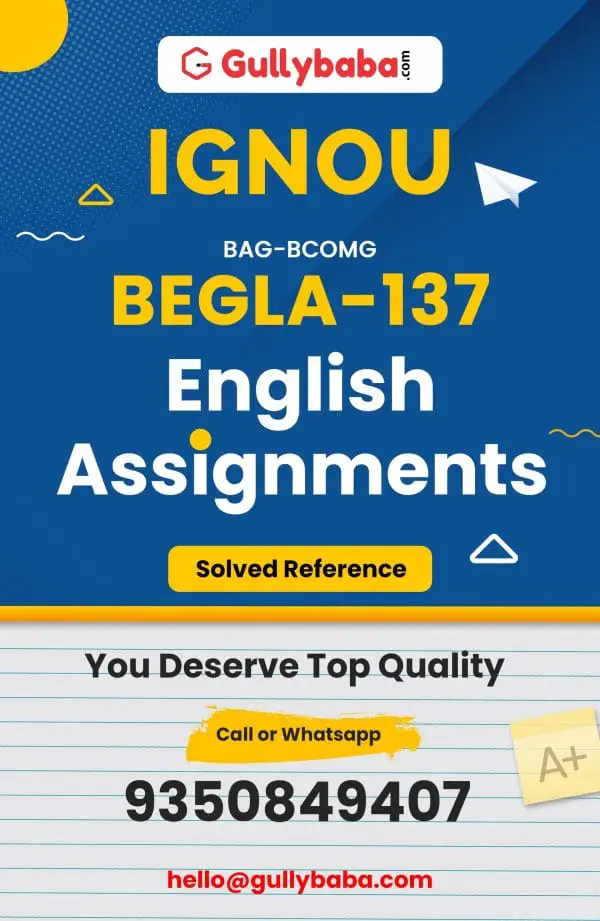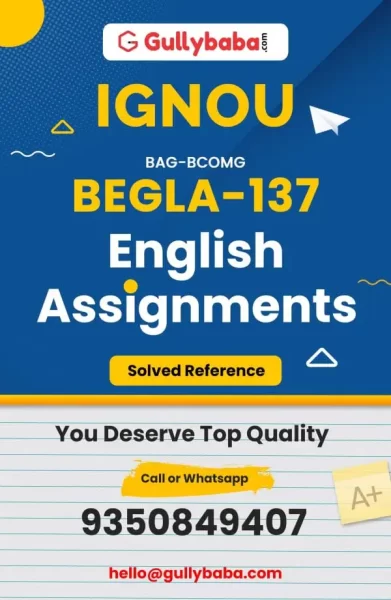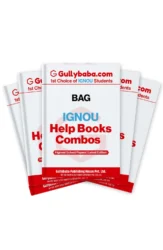PLEASE MATCH YOUR ASSIGNMENT QUESTIONS ACCORDING TO YOUR SESSION
IGNOU BEGLA-137 (July 2025 – January 2026) Assignment Questions
Answer all questions.
1. Put the bracketed verb in the correct form in the following sentences’ Identify the verb phrase type:
i) He is (sing). ______________________________________________________________
ii) Arun may be (expel). _______________________________________________________
iii) He has (accept) his mistake. __________________________________________________
iv) You ought (accept) your mistake. ______________________________________________
v) Arun has been (watch) the game for two hours. ___________________________________
vi) This song has already been (sing) twice. _________________________________________
vii) As a young man, I used (walk) seven miles a day. _________________________________
viii) He should have been (punish) for his carelessness. _________________________________
ix) I was (lead) to believe that the matter had (be) settled. ______________________________
x) This programme is (be) watched by millions of people all over the country.______________
2. Give the meanings of the following phrasal verbs. Use them in sentences of your own.
i) Cover up.
ii) Fell for
iii) Give up
iv) Bring up
v) Move in
vi) Look after
vii) Throw away
viii) Bring back
ix) Turn down
x) Stand for
3. Make sentences to bring out the difference in meanings,
i) Site and Sight
ii) Stair and Stare
iii) Break and Brake
iv) Son and Sun
v) Plain and Plane
vi) Straight and Strait
vii) Wait and Weight
viii) Hare and Hair
ix) Waist and Waste
x) Toe and Tow
4. State if the verbs in each of the following sentences are used as auxiliaries or as main verbs:
i) Do you have many friends in college?
ii) My sister likes to read poetry.
iii) God helps those who help themselves.
iv) You ought to know your religion well.
v) When did India become a Republic?
vi) A snake-bitten patient should not sleep.
vii) I noticed the difference.
5. Give the negative and question forms of the following sentences:
i) You called me.
ii) I can borrow his scooter.
iii) He will agree.
iv) You had a good breakfast.
v) You used to be frightened of him.
vi) You ought to have accepted the offer
vii) He might like it.
viii) You wanted me to come.
ix) He is talking sense.
x) Your uncle is waiting to see you.
6. Change the direct expressions into indirect forms and the indirect expressions into indirect forms.
i) Put all your books away.
ii) Have another mango.
iii) Unlock the door.
iv) Will you post all the letters?
v) I wonder whether you would write to him.
vi) Would you leave it to him?
vii) I thank you for the help.
viii) I wish you success in life.
ix) ‘I’ve been working,’ she said.
x) They said: ‘We’re going home.
7. Write short notes on any 4 of the following:
i) Rhythm
ii) Couplet
iii) Metaphor
iv) Personification
v) Similie
8. Discuss the various patterns of repetition used by poets to elevate their writings. Give examples.
IGNOU BEGLA-137 (July 2024 – January 2025) Assignment Questions
1. Fill in the blanks in the following sentences with words from the list below:
lame nestled Tell
beast experiments
wreathed hot
icy hand shadow
buried swallowed
i. I ……………………………………………….. close to her.
ii. The ……………………………………….. in a man may wake up, if he too much money.
iii. His face was ………………………… in smiles.
iv. ‘My autobiography is really a story of my ……………………………………………. (M.K. Gandhi: an Autobiography)
v. Youth is nimble, Age is …………………………………………………….Youth is ……………………………………….. and blood. (Shirley: ‘Death the Leveller’)
vi. Death lays his ………………………………..on kings. (Shirley: ‘Death and Leveller’ )
vii. Napoleon, the pig, was ……………………………..by the other animals in the farmyard.
viii. Life is but a walking ………………………………….(Shakespeare: Macbeth)
ix. Thus let me live, unseen, unknown; Thus unlamented let me die, Steal from the world, and not a stone ………………………………… where I lie. (A. pope: Ode on Solitude’)
x. The hungry river………………………………… down everything. (Tagore: Living or Dead’)
2. What meaning do the italicized words convey. Each word has a generally used meaning and in what shade of meaning it is used here. Explain.
i. You are acquitted of laziness.
ii. He was an assassin of all good virtues.
iii. It would be a crime to send the child out in the cold.
iv. The food was condemned as unfit for humans.
v. She was a victim of the mother-in-law’s tyranny.
3. Make two phrasal verbs from each of these verbs by adding adverb or/and a preposition,and use them in meaningful sentences:
i. get
ii. bring
iii.show
iv. put
v. round
4. Make sentences bringing out the difference in meaning in these pairs of words.
i. fare and fair
ii. tyre and tire
iii. grease and Greece
iv. gait and gate
v. hew and hue
5. a. What is ‘rhythm’? Explain.
b. Describe the metrical pattern in the following lines from Thomas Hardy’s poem The
Darkling Thrush.
I leaned upon a coppice gate
When frost was spectre-gray, And
Winter’s dregs made desolate The
weakening eye of day.
6. a. What is ‘alliteration’? Explain.
b. Point out the alliteration the following passages.
When the white feet of the baby beat across the
grass. The little white feet nod like white flowers
in a wind, They poise and run like puffs of wind
that pass, over water where the weeds are thinned.
(D.H. Lawrence: Baby Running Barefoo)
7. Write short notes on.
a. Simile
b. Metapphor
c. syneodoche
d. metonymy
e. personification.
8. Give the negative and question forms of the following sentences.
a. You called me.
b. I can borrow his scooter.
c. He will agree.
d. You had a good breakfast.
e. You used to be frightened of him.
9. Explain Repetition as a Rhetorical Device. Discuss various patterns of repetition.
10. Write polite forms for the following.
i. How much did these socks cost you.
ii. A has to put some additional chairs in his classroom. He wants some from B’s room
iii. A is visiting B. B offers him some tea (makes an offer): Have some tea.
iv. A has a headache and B makes an offer of help (makes an offer): I will give you an aspirin.
v. A’s bicycle tyres have very little air. He wants to use B’s Bicycle pump (asks for permission)







